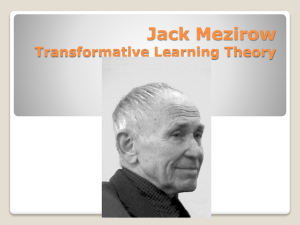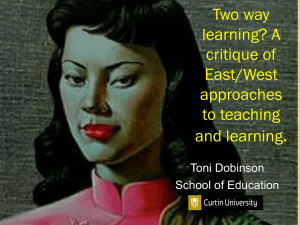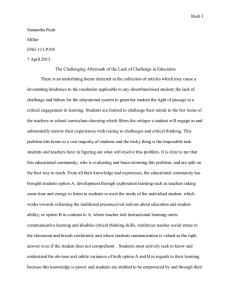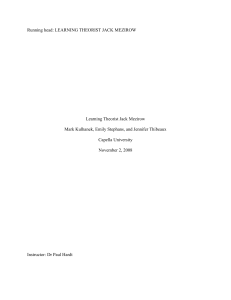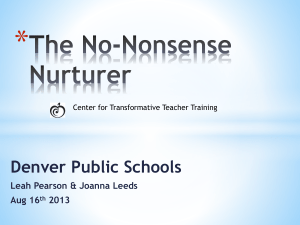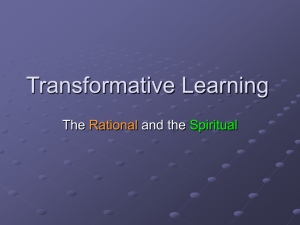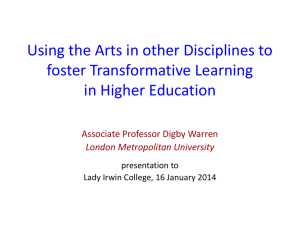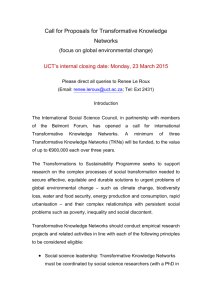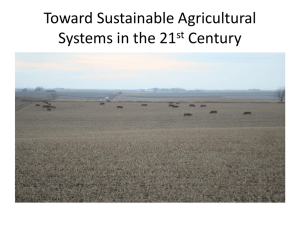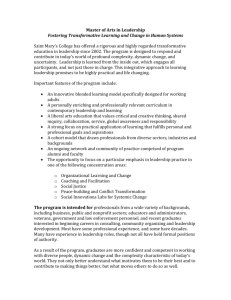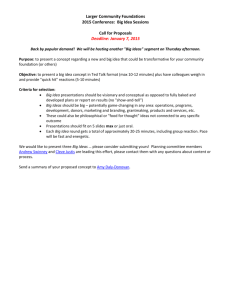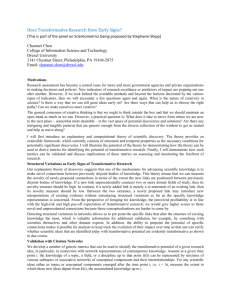APA 6th Edition Template - Mezirow-TLT
advertisement
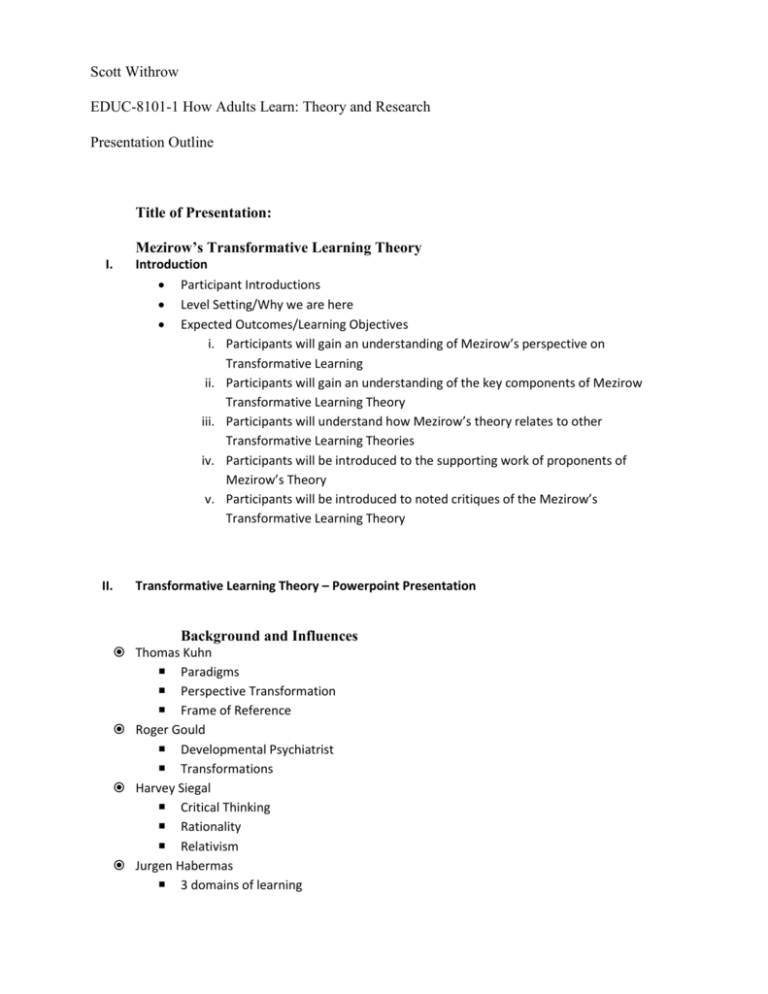
Scott Withrow EDUC-8101-1 How Adults Learn: Theory and Research Presentation Outline Title of Presentation: Mezirow’s Transformative Learning Theory I. Introduction Participant Introductions Level Setting/Why we are here Expected Outcomes/Learning Objectives i. Participants will gain an understanding of Mezirow’s perspective on Transformative Learning ii. Participants will gain an understanding of the key components of Mezirow Transformative Learning Theory iii. Participants will understand how Mezirow’s theory relates to other Transformative Learning Theories iv. Participants will be introduced to the supporting work of proponents of Mezirow’s Theory v. Participants will be introduced to noted critiques of the Mezirow’s Transformative Learning Theory II. Transformative Learning Theory – Powerpoint Presentation Background and Influences Thomas Kuhn Paradigms Perspective Transformation Frame of Reference Roger Gould Developmental Psychiatrist Transformations Harvey Siegal Critical Thinking Rationality Relativism Jurgen Habermas 3 domains of learning 2 Perspective Transformation Reflective Discourse Paulo Freire Conscientization 3 levels of consciousness Habits of the mind Disorienting Dilemma Critical Self Reflection Mezirow’s Theory & Perspective Definition Assumptions Cannot trust what they believe. There are no fixed truths Have a strong unrelenting desire to create meaning from our experiences Derive meaning by projecting preconceived value symbols to new experience based on prior developed frames of reference Continually search for more dependable beliefs and understandings Validate instrumental learning through empirically testing assertions of truth Validate communicative learning through self-reflection and discourse Are expected to negotiate their own meanings rather than simply accept those of others Key Concepts Meaning Schemes/Meaning Perspectives/Meaning Making Experience Critical Reflection Reflective Discourse Action Types of Learning – Mezirow identifies three Instrumental Learning Communicative Learning or Dialogic Self Reflective Disorienting Dilemma Critical Reflection Rational Discourse Development 3 Mezirow’s 11 Steps 1. a disorienting dilemma 2. self-examination with feelings of guilt or shame 3. a critical assessment of assumption 4. recognition that one's discontent and process of transformation are shared and that others have negotiated a similar change 5. exploration of options for new roles, relationships, and actions 6. planning of a course of action 7. acquisition of knowledge and skills for implementing one's plans 8. provisionally trying out new roles 9. Renegotiating relationships and negotiating new relationships 10. building of competence and self-confidence in new roles and relationships 11. reintegration of new assumption into one's life on the basis of conditions dictated by one's new perspective Transformative Leaning in Practice In Education o Role of Teacher o Role of Learner In the Workplace Alternate Points of View/Critiques Robert Boyd Larry Daloz Sharan Merriam Paulo Freire Mark Tennant Edward Taylor Conclusion Impact of Mezirow’s Theory Questions and Evaluation 4 Scott Withrow EDUC-8101-1 How Adults Learn: Theory and Research Handout Jack Mezirow Transformative Learning Theory Introduction Expected Outcomes/Learning Objectives Participants will gain an understanding of Mezirow’s perspective on Transformative Learning Participants will gain an understanding of the key components of Mezirow Transformative Learning Theory Participants will understand how Mezirow’s theory relates to other Transformative Learning Theories Participants will be introduced to the supporting work of proponents of Mezirow’s Theory Participants will be introduced to noted critiques of the Mezirow’s Transformative Learning Theory Definition Transformative Learning Theory: Key Concepts: Meaning Schemes/Meaning Perspectives/Meaning Making Experience Critical Reflection Reflective Discourse Action 5 Mezirow’s 11 Steps 1. a disorienting dilemma 2. self-examination with feelings of guilt or shame 3. a critical assessment of assumption 4. recognition that one's discontent and process of transformation are shared and that others have negotiated a similar change 5. exploration of options for new roles, relationships, and actions 6. planning of a course of action 7. acquisition of knowledge and skills for implementing one's plans 8. provisionally trying out new 6 roles 9. Renegotiating relationships and negotiating new relationships 10. building of competence and self-confidence in new roles and relationships 11. reintegration of new assumption into one's life on the basis of conditions dictated by one's new perspective Transformative Leaning in Practice Role of Teacher Role of Learner Alternate Points of View/Critiques Robert Boyd Larry Daloz Sharan Merriam Paulo Freire Mark Tennant Edward Taylor 7 Impact of Mezirow’s Theory Questions and Notes References Clark, C., & Wilson, A. (1991). Context and Rationality in Mezirow's Theory of Transformational Learning. Adult Education Quarterly, 41(2), 75-91. Dirkx, J. (2000). Transformative Learning and the Journey of Individuation. Clearinghouse on Adult Career and Vocational Education, 200(223), . Imel, S. (1998). Transformative Learning in Adulthood. ERIC Clearinghouse on Adult Career and Vocational Education, 200, . Merriam, S. (2004). The Role of Cognitive Development in Mezirow’s Transformational Learning Theory. Adult Education Quarterly, 55, . Merriam, S. B., Caffarella, R. S., & Baumgartner, L. M. (2007). Learning in Adulthood: A Comprehensive Guide (3rd ed.). San Francisco: Jossey-Bass. 8 Mezirow, J. (1994). Response to Mark Tennant and Michael Newman. Adult Education Quarterly, 44(4), 243. Mezirow, J. (1994). Understanding Transformation Theory. Adult Education Quarterly, 44(4), 222-232. Taylor, E. (1997). Building Upon the Theoretical Debate: A Critical Review of the Empirical Studies of Mezirow's Transformative Learning Theory. Adult Education Quarterly, 48(1), 34-59. Tennant, M. (1993). Perspective Transformation and Adult Development. Adult Education Quarterly, 44(1), 34-42.
